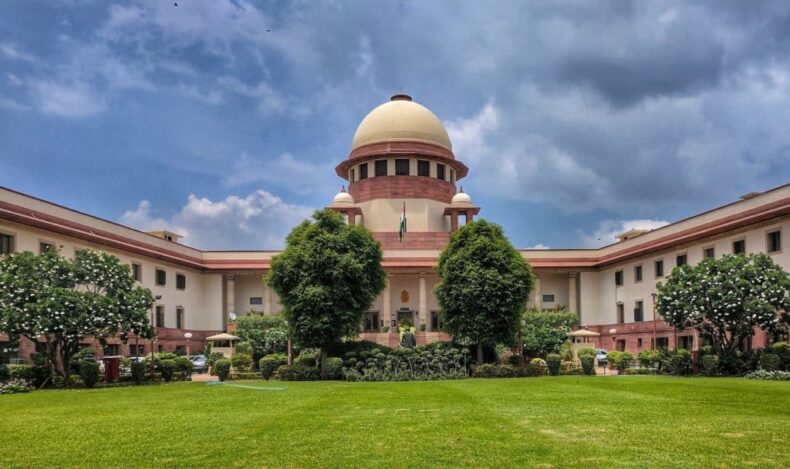The Supreme Court of India clubbed a bunch of petitions seeking legal recognition of same-sex marriage and referred the matter to a five-judge constitutional bench.
Matter of seminal importance
On March 13, 2024, a Supreme Court bench led by Chief Justice of India D.Y. Chandrachud referred the petitions seeking the legal recognition of same-sex marriage to a five-judge constitution bench.
Exercising the power under Article 145(3), a bench of CJI D.Y. Chandrachud, Justice P.S. Narasimha, and J. B. Pardiwala referred the matter to a five-judge constitutional bench as the petition involved a serious constitutional issue.

The apex court noted the issue is of seminal importance, and thus a larger constitutional bench would adjudicate on this “important matter” on April 18, 2024. The Supreme Court also directed that the hearing in the matter be live streamed on YouTube.
Petitioner’s stand
The petition, filed by Supriyo Chakraborty, Abhay Dang, and others, seek legal recognition of same-sex marriage under the Hindu Marriage Act, the Special Marriage Act, and the Foreign Marriage Act.
The petitioners pleaded in their affidavit that recognizing same-sex marriage is the next logical step after decriminalizing homosexuality under Section 377. In Navtej Singh Johar vs. Union of India, the Supreme Court read down the proviso of Section 377, legalizing consensual sexual relations between consenting adults of any gender.
Petitioners are citing the precedents set by Navtej Johar, the Puttaswamy privacy judgment, and the right of determination of sexual orientation. Advocates from the petitioner’s side argued privacy has been upheld and the right to life is a broad domain involving the right to marriage, procreation, and sexual orientation.

Referring to a legal ambiguity in the Hindu Marriage Act, the petitioner argued that the HMA’s requirements for legal marriage are “any two Hindus” and don’t require a specific gender.
Seeking an “institutionalized expression of love,” the petitioner argued that the binary of sex and gender shouldn’t dictate the arrangement of social institutions and that individuals should have the freedom to enter into any relationship.
Centre’s Stand
The Solicitor General of India, Tushar Mehta, represented the Centre. He cautioned the court that decriminalization and legal and social sanctity are two different things. He added that even the Navtej Johar judgment didn’t recognize the legality of same-sex marriage.
SG Tushar Mehta states unequivocally that no one is interfering with the right to love, but the right to marry is a social issue based on customs and therefore needs parliamentary sanction. In February 2021, the Centre stated its position that same-sex marriage can’t be a fundamental right and that such legal sanctioning of the practice would cause havoc in society.
In its petition, the Centre made a distinction between personal private domain and public domain and the consequent rights involved therein. The Centre maintained that decriminalization of homosexuality under Section 377 can’t be the basis of same-sex marriage, as the former is a matter of personal private domain, compatible with the right to privacy, but marriage is a public right that must be compatible with social ethos and customs.

The Centre in the Parliament cautioned about the psychological impact of same-sex marriage on children raised by such parents.
The central government affidavit on the institution of marriage said the union of men and women is ingrained in the social, cultural, and legal milieu of India. And importing western ideas without regard to the age-old customs, rituals, and practices would cause complete havoc in Indian society.
Procreation and emotional companionship
CJJ D.Y. Chandrachud said, in his opinion, that procreation is not the only motive for which two people choose to come together, as society has evolved to include other factors, including emotional companionship.
The apex court cited and conjoined the idea of the right to marry or choose a life partner with the right to privacy and the right to life and personal liberty under Article 21 of the constitution.

Shafin Jahan vs. Ashokan KM was cited by the apex court, wherein it held that the choice of partner falls under the exclusive domain of the individual. Relegating the need for social approval, SC cited that recognition of intimate personal decisions is not dependent on social approval.













